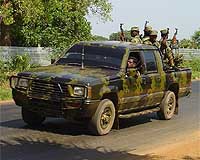| . |  |
. |
Buenos Aires (UPI) Aug 19, 2009 Argentina's ambitious plans to renew and upgrade its defense structures have suffered a setback because of protracted economic problems and the impact of the global recession. As economically buoyant Brazil and oil-rich Venezuela splash out on new weaponry, sometimes more for diplomatic or political reasons than in response to urgent military needs, Argentina's military command has watched with growing dismay as its infrastructure sinks into obsolescence amid a combination of bureaucracy, corruption, procrastination and cash crunch. Money for the military has been short for some years, but more recently the cash-flow crisis has plumbed new depths as Argentina's economic uncertainties take their toll. Despite well-intentioned economic reform measures, external factors and political miscalculations by President Cristina Fernandez de Kirchner have combined into a deadly and potent seepage that is proving to be corrosive for the economy. The Economist says this year's farm strikes and June election losses have turned Fernandez into a "lame duck president." It said Argentina's GDP growth, which slowed from 4 percent in the fourth quarter of 2008 to 2 percent in the first quarter of 2009, could shrink further. "Having ramped up spending ahead of the election despite weakening revenue growth, a fiscal adjustment will have to take place in the second half of the year if the government is to avoid the risk of a new default," The Economist said. All of that is depressing news for the military, which has been waiting for funds to finance expansion and renewal promised by former President Nestor Kirchner, the incumbent's spouse, and enshrined in a 2006 defense law. In an unguarded moment Bolivian President Juan Evo Morales said this month he feared extreme right-wing politicians could topple Fernandez in the aftermath of the election debacle and chronic economic woes. Morales apologized for the comment, but Argentine analysts have echoed those concerns in less alarmist terms. Would such an eventuality suit an impatient military's agenda? It's hard to tell because, firstly, Fernandez she still has the generals' support and, secondly, she has moved quickly to make good losses suffered in the election. Amid a simmering crisis between Colombia and Venezuela, Fernandez swept into Caracas and signed up lucrative export contracts with President Hugo Chavez, then promised to double up as trouble-shooter and called a healing session of the Union of South American Nations leaders on home ground to defuse tension over U.S. troop presence on anti-narcotic duty in Colombia. Colombian President Alvaro Uribe, who stayed away from an earlier summit in Quito, Ecuador, has agreed to attend the summit, which will take place Aug. 28 in the scenic Argentine resort of Bariloche. The tense standoff over Colombia has heightened anxiety within Argentine military ranks, as have "winds of war" pronouncements by Chavez over the Colombia-U.S. military cooperation. Analysts said the Argentine military's unease stemmed from an acute sense of unpreparedness, whether it was called upon to act in a conflict involving regional powers or as peacekeepers in a pre- or post-combat situation. Nestor Kirchner's military modernization program called for a start-up in 2010, but analysts now say 2025 would be more realistic, unless Argentina stages a miraculous economic recovery in the coming years. Defense procurement is at a standstill as cash inflows are consumed by salaries, upped frequently to keep the military happy and its earnings scales competitive with the civilian sectors. Purchase programs already suspended or canceled include the Gaucho wheeled light vehicle for the army, offshore patrol vessels for the navy and the procurement of Russian Mi-17 helicopters. The air force's Mirage III fighter fleet is badly in need of replacement. Military hardware across the board is being rendered unusable because of unsteady supply parts, for which funding is non-existent. Fernandez will need to fine-tune a balancing act to keep funds flowing into the military programs even in tough economic times, analysts said. Share This Article With Planet Earth
Related Links The Military Industrial Complex at SpaceWar.com Learn about the Superpowers of the 21st Century at SpaceWar.com
 British lawmakers urge review of Sri Lanka arms exports
British lawmakers urge review of Sri Lanka arms exportsLondon (AFP) Aug 19, 2009 Britain should review all arms export licences to Sri Lanka in the wake of the recently-ended war with Tamil Tiger rebels, lawmakers said Wednesday. Ministers should also provide full details of what British arms were used by Sri Lankan forces during the conflict, the Committees on Arms Export Controls said in its annual report. "We recommend that the government ... read more |
|
| The content herein, unless otherwise known to be public domain, are Copyright 1995-2009 - SpaceDaily. AFP and UPI Wire Stories are copyright Agence France-Presse and United Press International. ESA Portal Reports are copyright European Space Agency. All NASA sourced material is public domain. Additional copyrights may apply in whole or part to other bona fide parties. Advertising does not imply endorsement,agreement or approval of any opinions, statements or information provided by SpaceDaily on any Web page published or hosted by SpaceDaily. Privacy Statement |